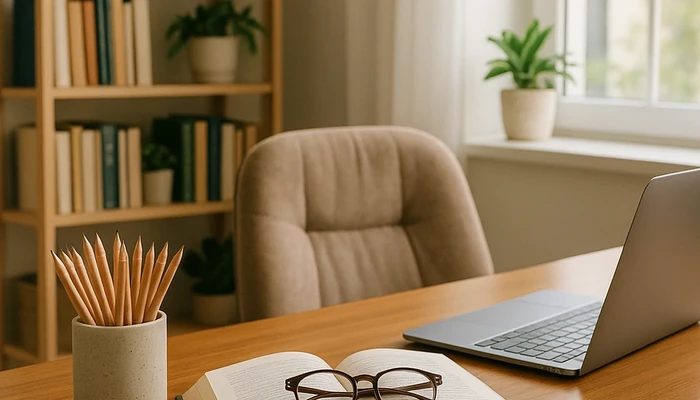Maintaining Clean Study Areas in Rentals: Professional Guidelines and Practical Steps
In today’s fast-paced rental market, maintaining clean study areas in rentals is essential for tenant health, productivity, and satisfaction. Whether you manage a student apartment, an Airbnb, or a multi-unit property, clean and organized study spaces make a lasting impression. In this expert guide, you’ll discover proven routines, practical checklists, and strategies for both do-it-yourself upkeep and working with professional cleaning services. CHI Cleaning Services brings their experience to help you create healthier, more effective study environments for every kind of rental property.
Understanding the Unique Cleaning Needs of Study Spaces in Rentals
Study areas in rental properties, whether designated rooms or multipurpose spaces, face a unique set of challenges. High traffic, mixed usage, food consumption, and varying schedules contribute to clutter and contamination risks. Landlords and property managers must recognize these needs to set standards that appeal to students, professionals, or families renting their property.
- Daily use of electronics increases dust and allergen buildup.
- Shared spaces often lead to inconsistent cleanliness unless clear protocols exist.
- Food debris and spills create bacteria hotspots in desks and lounge areas.
Professional cleaning routines address these with specialized equipment and products, targeted for multiple surfaces and high-touch points.
Identifying Common Contaminants and Health Risks in Rental Study Areas
Neglected study areas often harbor dust, allergens, and bacteria that can affect respiratory health and cognitive performance. For renters and property owners in Chicago, Illinois—or any urban setting—understanding these risks is the first step toward prevention.
- Dust mites and pet dander accumulate in upholstered chairs and carpets.
- Keyboard surfaces and shared desks become reservoirs for germs.
- Mold and mildew can develop in poorly ventilated spaces.
Studies cited by the Centers for Disease Control and Prevention stress the importance of regular, thorough cleaning to reduce the spread of viruses and promote overall well-being in shared environments.
Key Differences Between DIY and Professional Cleaning of Study Spaces
When it comes to maintaining clean study areas in rentals, both DIY efforts and professional services have their place. Here’s a comparison to help you understand the strengths of each approach:
- DIY Cleaning: Cost-effective, flexible, and ideal for light maintenance between scheduled services. Limitations include lack of commercial-grade products, missed high-touch areas, and insufficient deep cleaning.
- Professional Cleaning: Brings advanced equipment, trained teams, and strict protocols to ensure every surface and object is hygienically cleaned—especially for high-residency rentals or turnover between tenants.
For optimal results, combine a daily upkeep routine with periodic deep cleans from a trusted provider.
Essential Supplies and Tools for Cleaning Rental Study Areas
Equipping tenants and staff with the right materials is critical for successful upkeep. Here’s a recommended toolkit for study space cleaning:
- Microfiber cloths (capture dust and allergens without scratching surfaces)
- HEPA-filtered vacuum cleaner (especially for carpets and soft furnishings)
- Multipurpose disinfectant: EPA-registered, safe for desks, chairs, and electronics
- Glass cleaner for screens and windows
- Disposable gloves
- Organizers and storage bins (to reduce clutter and promote order)
Professional teams supplement these with high-grade misters, steamers, and specialty solutions for sensitive electronics and shared equipment, ensuring comprehensive disinfection with every visit.
Developing a Cleaning Schedule That Fits Every Rental Situation
No two study spaces are identical. Consider these scenarios when designing your cleaning calendar:
- Short-term rentals (Airbnb, student housing): Clean and disinfect between every stay or occupancy change.
- Long-term rentals: Recommend weekly light cleaning and monthly deep cleaning of study spaces, including electronics and bookshelves.
- Shared commercial or co-working rentals: Schedule daily wipe-downs and bi-weekly professional visits, adjusting based on occupancy rates.
Flexibility in frequency and task rotation ensures both tenant satisfaction and asset preservation.
Room-by-Room Approach: Cleaning Varied Study Setups in Rentals
Study areas manifest in many forms, from solo desks in bedrooms to communal workspaces. Here’s how to address popular layouts:
| Study Area Type | Cleaning Focus | Recommended Frequency |
|---|---|---|
| Dedicated study room | Desks, electronics, floors, chairs | Weekly light; monthly deep |
| Corner desk setup | Surface, cables, chair, wall area | Weekly |
| Shared open space | Table, electronics, touchpoints, bins | Daily basic; weekly thorough |
| Convertible multi-use room | Declutter, sanitize upon transition | After each use |
Step-by-Step Cleaning Workflow for Study Areas
- Declutter: Remove personal items, papers, and trash before starting.
- Dust Above-to-Below: Begin with ceiling fixtures, then bookshelves, desk surfaces, and chair backs.
- Disinfect High-Touch Areas: Wipe down keyboards, mouse devices, drawer pulls, light switches, desk edges, and remote controls.
- Clean Electronics and Screens: Use screen-safe cleaners and lint-free wipes.
- Vacuum and Mop Floors: Target underneath furniture and along walls.
- Replace Trash Bags and Restock Supplies: Check for recycling needs and restock pens, notepads, or hand sanitizers.
This routine helps maintain clean study areas in rentals with minimal disruption to tenants’ routines.
Sanitizing Shared Furniture, Desks, and Electronic Devices
Rental study areas often include shared desks and computers, requiring heightened hygiene protocols. The Barbicide certification for cleaning professionals sets a high bar for disinfecting non-porous surfaces, which is especially important in group study lounges or multi-tenant apartments.
- Use alcohol-based wipes for electronics, but never oversaturate devices.
- Focus on chair arms, desktops, power outlets, and device cables.
- Allow sufficient dwell time for disinfectants; check manufacturer guidelines for electronics.
Checklist: Keeping Study Areas Organized and Clutter-Free
- Designate storage bins or drawers for supplies
- Implement a weekly filing routine for documents and books
- Assign “no food or drink” policies in sensitive electronics areas
- Label shelves and organize by purpose (textbooks, tech, stationery)
- Provide cable organizers to reduce trip hazards and dust traps
Encourage tenants or users to follow the organization checklist, making it easier for cleaning staff to access all surfaces and maintain high standards.
Addressing Air Quality and Ventilation in Study Spaces
Good air quality supports both concentration and overall health. When maintaining clean study areas in rentals, don’t overlook:
- Regular inspection and cleaning of air vents and filters (swap or clean every 3–6 months)
- Use of air purifiers, especially in larger or high-use spaces
- Routine window cleaning and encouraging natural ventilation
- Monitoring humidity to prevent mold growth
Proper ventilation reduces allergens and odors, contributing to a more appealing study environment.
Promoting Hygiene and Safety in Communal Study Zones
Shared study spaces in rentals, such as lounge rooms or conference nooks, demand vigilant hygiene practices:
- Install hand sanitizing stations at entrances
- Post reminders for users to wipe down equipment after each session
- Provide disposable disinfectant wipes and trash cans
- Schedule regular professional disinfection for all high-traffic spots
Referencing CDC guidelines strengthens your protocols, particularly in times of heightened illness awareness.
Selecting a Professional Cleaning Service for Rental Study Areas
Not all cleaning providers are equally equipped to handle the unique requirements of rental study spaces. Here’s what to look for:
- Experience with both residential and commercial rental properties
- Trained teams using consistent quality checklists
- Flexibility for scheduled, deep, and emergency cleaning needs
- Clear communication and transparent pricing
- References for similar environments (e.g., student buildings, workspaces, Airbnb)
A professional service, such as CHI Cleaning Services, brings these advantages and can tailor protocols to your specific rental setup.
Tenant and Property Manager Roles: Collaboration for Clean Study Spaces
Maintaining clean study areas in rentals requires cooperation between tenants and managers.
- Tenants: Responsible for daily tidiness and reporting spills or damages promptly
- Managers: Provide resources, enforce standards, schedule professional cleaning, and communicate expectations clearly
- Jointly create a cleaning calendar and feedback process
Troubleshooting: Tackling Persistent Issues in Rental Study Areas
- Unpleasant odors: Clean carpets, empty trash regularly, and use air purifiers
- Stubborn stains: Use enzyme cleaners or consult professionals for deep stains on carpets and upholstery
- Recurrence of clutter: Offer more storage solutions or regular decluttering reminders
- Electronics malfunction from improper cleaning: Always use device-safe products and soft cloths
Comparison: Professional Cleaning Framework vs. Typical Tenant Upkeep
- Professional cleaning: Systematic process, specialized cleaning products, deep sanitization, records for property value protection, and compliance with CDC-backed protocols
- Typical tenant upkeep: Focus on surface tidiness, occasional disinfection, and reactive rather than proactive measures
Combining both approaches creates the healthiest, most attractive rental study spaces.
Maintaining Value: The Business Impact of Clean Study Environments
Clean, organized study spaces drive rental satisfaction and improve property value, especially in competitive markets like Chicago. Well-maintained areas:
- Enhance tenant retention and attract quality applicants
- Reduce long-term wear and costly refurbishments
- Support positive rental reviews and Airbnb ratings
Read more about maximizing property value through regular cleaning and keeping rented spaces healthy and appealing.
Integrating Cleaning Routines: Coordination with Other Rental Areas
To increase efficiency, coordinate study area cleaning with wider property routines, such as kitchen, rest area, and bathroom cleaning cycles. This integrated approach minimizes disruption and ensures total property hygiene.
Explore more about cleaning rest areas and strategies for efficient cleaning schedules.
FAQ: Maintaining Clean Study Areas in Rentals
- How often should study areas in rentals be professionally cleaned?
- For shared spaces, schedule cleaning at least weekly. Private study areas may require monthly deep cleaning and routine surface cleaning by tenants daily or weekly.
- What is the best way to sanitize electronics in study spaces?
- Use alcohol-based wipes or sprays rated safe for electronics, avoid excess moisture, and let surfaces air dry. Always check manufacturer guidelines.
- Can tenants use their own cleaning supplies for study areas?
- Yes, provided they’re approved for surfaces present in the study space. A list of recommended products is helpful for consistency.
- How can landlords encourage tenants to keep study spaces clean?
- Provide clear guidelines, post friendly reminders, and supply quality cleaning materials. Regular inspections and feedback loops help maintain standards.
- What’s included in a professional study area cleaning service?
- Decluttering, dusting, disinfection of all surfaces, electronics-safe cleaning, floor care, trash removal, and replenishment of supplies, all performed using a detailed checklist.
- Are there special recommendations for allergy sufferers?
- Yes, use HEPA-filtered vacuums, regularly wash fabrics, and utilize hypoallergenic cleaners. Maintain ventilation and control indoor humidity to reduce allergens.
- What should property managers do if persistent odors remain?
- Check for unseen spills or mold, clean soft furnishings, and if issues persist, hire a professional with odor-neutralizing equipment.
Summary and Next Steps
Maintaining clean study areas in rentals is a joint effort. Combining daily tenant hygiene with scheduled professional cleaning from a reliable company ensures health, performance, and long-term property value. For specialized cleaning in Chicago or expert advice on maintaining any study environment, trust proven protocols—and don’t hesitate to request tailored recommendations.
About CHI Cleaning Services
CHI Cleaning Services helps households and businesses in Chicago, Illinois and nearby areas keep their spaces clean and healthy. Specializing in recurring house cleaning, deep cleaning, move out cleaning, office, and facility cleaning, our trained staff follow strict quality checklists and use professional products for every surface. We prioritize clear communication, flexible scheduling, and long-term client relationships. Choose CHI Cleaning Services for reliable cleaning tailored to your needs.

cleaning service, commercial cleaning chicago il, commercial cleaning company chicago, Palos Hills commercial cleaning companies, Franklin Park commercial cleaning, commercial cleaning in Fort Sheridan IL, commercial cleaning companies in Monee IL, Niles commercial cleaning, commercial cleaning companies in Westmont IL, commercial cleaning Lake Forest
